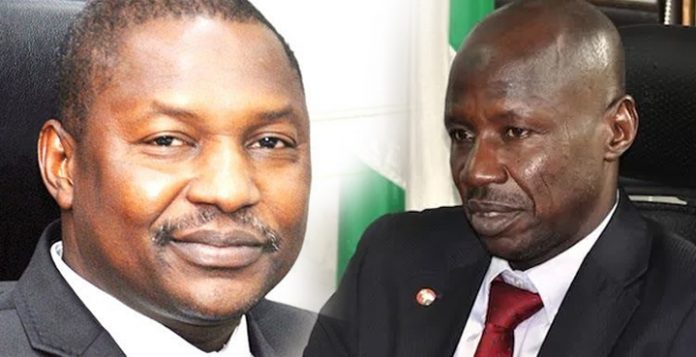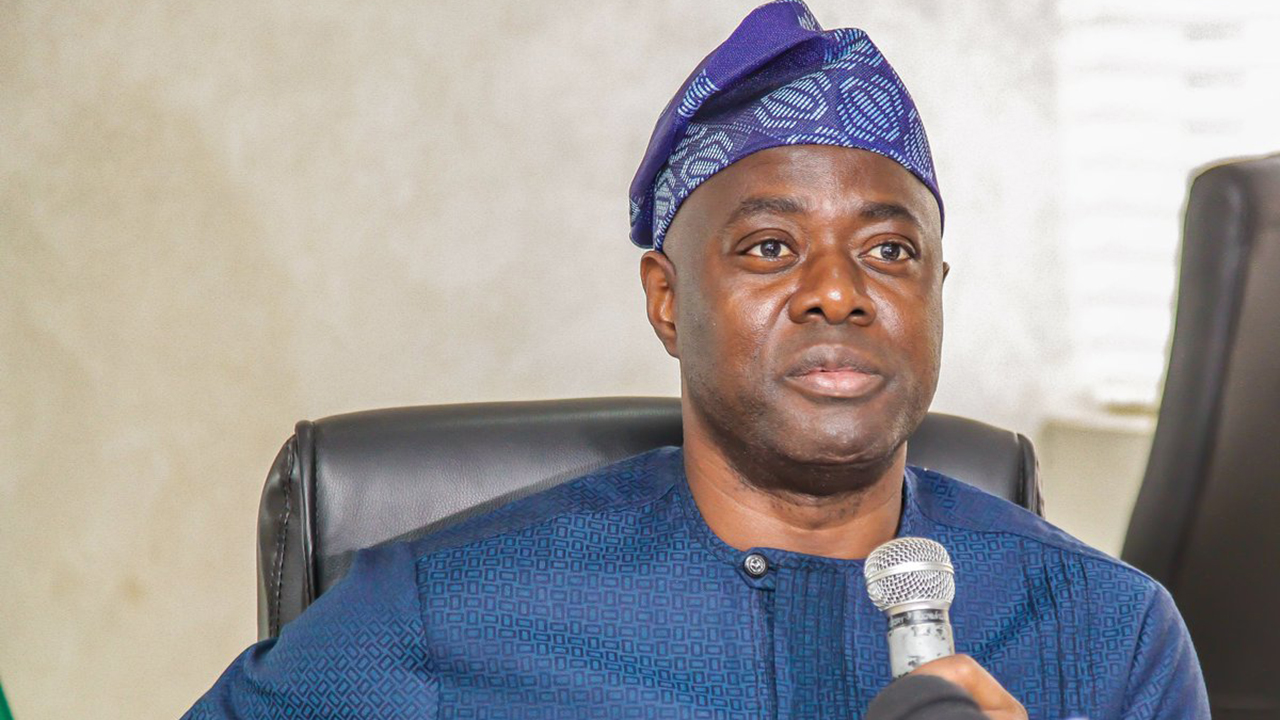Though they have been trying to hide it from the general public, the suspension of Nigeria from EGMONT Group has exposed the bitter rivalry between the Attorney General of the Federation (AGF) and Minister of Justice, Mr. Abubakar Malami (SAN) and the Acting Chairman of the Economic and Financial Crimes Commission (EFCC), Ibrahim Magu.
In what can be referred to as a setback to the war against corruption, one of the cardinal points of President Muhammadu Buhari-led administration, Malami openly attacked Magu over what he described lack of synergy on the Egmont issue.
The Daily Times recalls that when the issue of bickering between the two vital bodies in the fight against corruption broke out, the response was that there was no love lost.
The drama started with the request from the office of the AGF, asking Magu to release the case files of high profile cases and corrupt public office holders which the EFCC reportedly declined. But the bubble busted on Wednesday when the office of the AGF openly accused Magu of frustrating the war against corruption and behaving as if the commission is an island.
The AGF further went on to accuse the EFCC of doing everything to frustrate the lifting of EGMONT suspension on the grounds that the EFCC is not willing to lose control of the Nigerian Financial Intelligence Unit (NFIU). Accusing Magu of subterfuge, Malami said:
“It is a sad tale to tell how the Acting Chairman, Ibrahim Magu-led EFCC has frustrated these efforts and even had to resort to blackmail in some instances often times, alleging that the AGF and the Ministry were all out to impede the government’s anti-corruption drive.
“Magu and other EFCC officials had through several online publications accused the Minister of trying to compromise the war. They have always perceived the Office of AGF as a threat instead of addressing the issues relating to the best strategy to fight corruption advocated by the AGF.
“For instance, during the House of Representatives Committee review session on 18th April, 2017, Magu vehemently rejected the new Money Laundering (Prevention and Prohibition Bill 2016 submitted by the President, which according to him, as reported by some national dailies, might prejudice President Muhammadu Buhari’s anti-corruption agenda.
“He even went on his whimsical best by convincing that passing the bill into law now will affect Nigeria’s application for the membership of the Financial Action Task Force (FATF).
“In likewise, the EFCC is now in a state of paranoia, as it dreads the effort of the government to have an independent NFIU which it has stood against stoically since 2006. “As it presently stands, the NFIU staff are all deployed by the EFCC to serve in the interest of whoever is its current Chairman.
This has to stop if it must conform to the new thinking and global best practice. “Nigeria cannot be an island of its own. It cannot fight corruption in isolation.
The threat of expulsion from the EGMONT group calls for a thorough review of the NFIU and the manner in which the EFCC leadership has manipulated and misused intelligence to the detriment of the fight against corruption and financial crime in Nigeria”.
But, a reliable source at the EFCC said the AGF’s allegations were baseless and made in bad faith, insisting that the EFCC will not take up issues with the AGF as the issues involved are that of personal interest and not about fighting corruption. He said:
“It is instructive to state that there is a particular lady called Mrs. Juliet Ibekaku-Nwagwu that was removed from NFIU but now working with the AGF as Special Assistant to the President on Justice Sector Reforms.
“Incidentally, the Chairman, Senate Committee on Anti-corruption, Senator Chuka Utazi, comes from the same area with the said Juliet.
Therefore every attempt is being made now to bring the lady back to NFIU. “So, Magu is just a victim of circumstances. I wish to inform you that Magu is focused and will not be distracted. He is doing everything possible to ensure that the war against corruption is on course”.
The Daily Times further gathered one of the issues is that the NFIU is domiciled in EFCC Act and the development is causing some disquiet in certain quarters.
The Special Adviser on Media and Publicity to AGF, Mr. Salihu Othman, had taken up issues with Magu in a statement made available on Wednesday.
The statement reads in part: “At its 24th Plenary of the Group held in Macao, a Chinese Special Administrative Region (SAR) from July 2-7, 2017, chaired by Mr. Sergio Espinosa, chair of the Egmont Group, Nigeria was suspended for flouting its laid down rules and regulations.
“The group at the meeting where about 354 participants representing 112 Financial Intelligence Units were in attendance particularly reprimanded Nigeria, for lack of the independence of the Nigeria Financial Intelligence Unit (NFIU) from the Economic and Financial Crimes Commission (EFCC).
“Besides, its decision by consensus to clampdown on Nigeria arose from repeated failures on the part of the NFIU to address concerns regarding the protection of confidential information, specifically related to the status of suspicious transaction report (STR) details and information derived from international exchanges.
“However, the Group has expressed its desire to lift the suspension if the Nigerian authorities will address its concerns before December 2017 deadline or face expulsion.
“It recalled that since 2006 when the NFIU was established, it has been under the control of the EFCC as enshrined in Section 1(2) (C) of the EFCC Act that stipulates that the Commission is the designated Financial Intelligence Unit (FIU) in Nigeria, which is charged with the responsibility of coordinating the various institutions involved in the fight against money laundering and enforcement of all laws dealing with economic and financial crimes in Nigeria.
“In essence, EFCC is the NFIU. Without a clear legal framework, it is obvious that the NFIU cannot function independent of the EFCC as required by the Egmont Group.”
The statement added that so much water has passed under the bridge and that in line with the new trend and in consonance with international best practice, the AGF had through a memo numbered HAGF/SH/2016/Vol.1/2 sent two bills to President Buhari- ‘Request to Transmit Two (2) Bills to the National Assembly’ – a development that would strengthen the war against corruption




